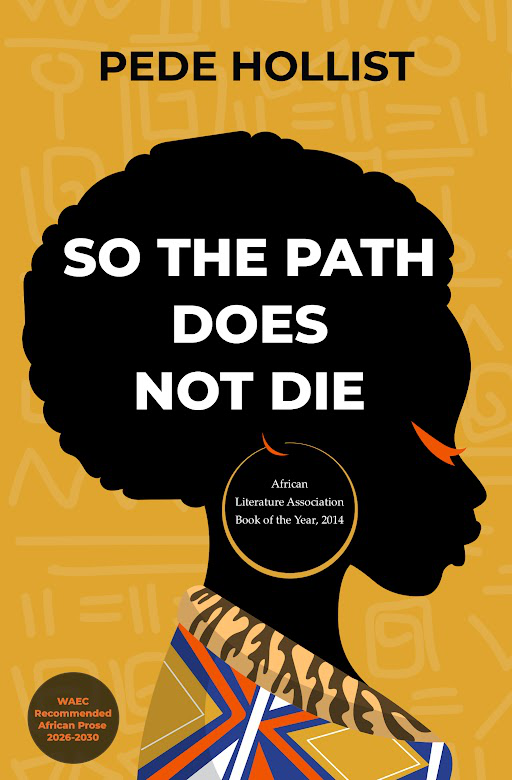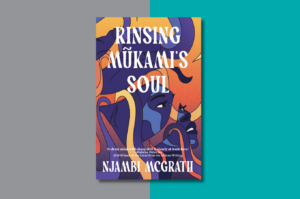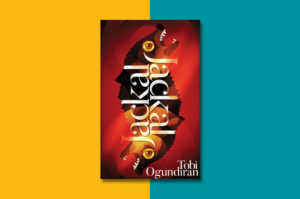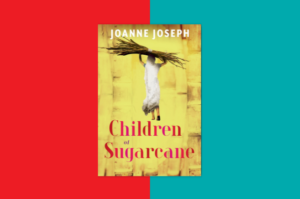
Finaba Marah could tell from the length of Baramusu’s stride, her erect shoulders and granite stare that her grandmother had come for serious business, so she sprang from under the tree where she had been sucking sugar cane, spat out the dry pulp, and ran toward her. She slid her hand into her grandmother’s and skipped alongside to keep pace with the tall, sinewy woman who fed her ogi and thick slices of plantains fried in palm-oil when she was younger.
“How are you?”
Baramusu did not answer. She veered toward her daughter-in-law’s mud-packed, palm-thatched house.
Finaba knew trouble lay ahead. She spent considerable time around adults and had become adept at understanding their behavior. However, this afternoon, she did not need that experience to understand the reason for her grandmother’s visit. Baramusu had come to talk about her.
As soon as they entered the house, Finaba’s mother, Nabou, ordered the child to play outside. Finaba left the house but did not go to play. She walked to the back, sat underneath the open window, and listened to their conversation.
“We don’t have to be excised, Baramusu,” Nabou tightened her lappa and sat down next to the rickety wooden table on which lay the black second-hand Bible Finaba had been studying for her religious knowledge exam.
“Allah dando! It may be that you city women are proud to carry that ugly manhood between your legs, but that is not our way here.” Nabou’s city background, particularly that she was not a musu ba, an initiated woman, irked Baramusu, the most well-known digba in Koinadugu.
Her son, Amadu, had brought Nabou home as his wife after a visit to an uncle in Conakry. Tall, almost stately with her high cheekbones and round eyes, Nabou spoke Fulani fluently and efficiently performed her wifely duties. But Baramusu resented that Amadu had not consulted her in choosing a bride, especially because she had started negotiations for a girl she was now convinced better understood her role as a wife. Aware of her mother-in-law’s resentments, Nabou had learned to be firm when dealing with Baramusu.
“I don’t want this for Finaba, not after what happened to Dimusu.”
“The ancestors sent your firstborn here and chose to take her away. Why do you blame me?”
“I don’t, but Finaba must not miss school.”
“Si-kool?” Baramusu glanced at the Bible. “Will si-kool teach her how to preserve our ways?”
“Don’t you want Finaba to do more than cook and care for a husband and children?”
“The family crumbles when women do not care for their men and children.” Baramusu stood up as if to emphasise the truth of her assertion. Nabou followed suit.
“I want my daughter to learn new ways, just like the sons of our village.”
“Pssh! Sons who seek nothing but wealth for themselves and never come back? Old Mama Fatou’s sons send money for her. Does the money feed and clean her? And yet you want to send our daughters away to follow footprints in the sand?”
Baramusu paused but continued to scowl. “Okay,” she exhaled, “if you must send this child away, at least let her leave here a musu ba. Our ways will escort her among strangers.”
“Finaba is just a child,” Nabou’s arms fell limply to her side, and she stared at the crusted earth of the soil.
“Stop fooling yourself.” Baramusu pounced into Nabou’s hesitation. “Have her breasts not come? You think the men have not noticed? Do you and Amadu want to become the foolish husband and wife so busy admiring their ripe fruit that they overlooked when it started to rot? People are already talking and soon her age mates will shun her. Finaba is ready! The initiation will make her a woman—”
Nabou recovered her resolve. “Like it did to Dimusu?”
“Will you not let Dimusu rest in peace? Do you forget the great healer told us your children came to show us the path?”
“Yes, that the path we follow in cutting is wrong. That we must do things differently, learn new ways,” Nabou held Baramusu’s stare. “She who has never traveled thinks that her mother is the only good cook in the world.”
“Yes, but do not ask for soup if God dishes your rice in a basket. I am not against learning, but new ways are like strange food. Eat it in small doses. Otherwise, you will spend much time in the latrine.”
Baramusu stomped towards the entrance as if to leave. Then she stopped, turned around, and spoke softly to Nabou, like a weary parent to a recalcitrant child. “Our lives today are the harvest left to us by women like you who refused to see what is at their feet but instead looked to the horizon. The ways of white people bring only trouble. Si-kool turns our children’s heads away from home. The path you and Amadu have chosen for this child will lead to nothing but trouble. A wise woman walks through the high grass where the elephant trod so she does not get soaked with dew. So the path does not die, do not follow footprints in the sand.”
“Those who leave footprints in the sand cannot expect followers. Finaba will not go to the initiation!”
Outside the window, Finaba ground her fists into the sunbaked earth. Now she will not belong, be unable to dance and sing with the other initiates, and not have people in the village cheer and tell her that she is beautiful and brave. If her age mates ever allow her into their circle, she will always be the outsider, the one who will not be trusted, and the one who will never understand what makes and binds women together.
***
“No one will like me, and no man will want to marry me, Baramusu,” Finaba lamented as she escorted her grandmother out of their compound. Her face stern, as if pondering weightier matters, Baramusu neither answered nor acknowledged the complaint.
“My age mates will never trust me. I will be the one who does not belong, who is not a woman. Why is Mama doing this to me?” She wiped the tears from her eyes.
“Do you know the story of Musudugu?” Baramusu stopped, faced her granddaughter, and waited for her answer.
“No.” Finaba pouted, irritated and surprised at the sudden change in topic.
Baramusu walked over to the forest side of the path and eased herself onto the bulging arteries of a baobab tree.
“Come here, and let me tell you.” Finaba sat down beside her grandmother. “Your mother sends you to si-kool to learn the white man’s stories, but she does not tell you ours, the ones that make us women.”
***
Buy So the Path Does Not Die here: Narrative Landscape
Excerpt from SO THE PATH DOES NOT DIE published by Narrative Landscape Press. Copyright © 2024 by Pede Hollist.









COMMENTS -
Reader Interactions